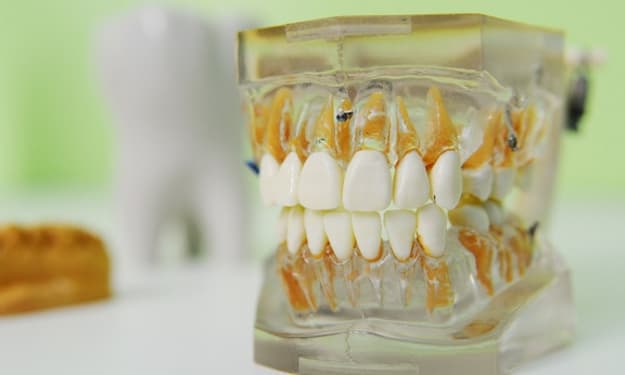What to Do If You Are Diagnosed with Periodontal Disease?
Periodontal surgery in Michigan.

Periodontitis is severe gum disease. In other terms, it is inflammation in the supporting structures around the tooth. Lack of proper oral hygiene, bacteria and other microorganisms stick to the surface of the tooth. If you don’t consult a good dental surgeon to undergo Periodontal Maintenance Therapy in Michigan, bacteria may erode the bone that supports your teeth, and untreated periodontitis will eventually result in tooth loss.
Periodontal surgery is fairly uncommon in people under 30; it can still affect anyone with poor oral hygiene and increase the risk of stroke, heart attack, and other health problems.
In this blog, we help you with a guide to understanding periodontal disease and what are its maintenance and treatment plans.
Let's look at the symptoms first:
In most cases, periodontitis symptoms may not appear until a person is in their 40s or 50s, and when this disease advances over time, it may already cause irreversible damage. So, be aware of the following signs:
• Pain when eating or chewing.
• Swollen gums.
• A discolored plague on the teeth.
• Bad breath.
• Bleeding while brushing or flossing.
• Receding gums.
• Loss teeth.
• A metallic taste in the mouth.
• Pus between the teeth and gums.
• Changes in the fit of partial dentures.
What are the risk factors?
• Genetic factors: If any of your family members has periodontitis, you’re more likely to develop it because your immune system would react the same way.
• Poor oral hygiene: Oral health can affect the overall health. Without proper oral hygiene, like not brushing and flossing regularly, bacteria can reach higher levels to develop the periodontal condition.
• Smoking: If you smoke, the risk of gum problems is higher than those who don’t smoke. Moreover, smoking undermines the efficacy of treatment.
• Age: Usually, periodontal disease happens after the age of 35 years; however, the risk of consequences can start at any age, such as tooth loss, receding gums, and more. In addition to age, if your immune system is weak, then due to health conditions and medication, you may be at high risk of gum disease.
• Type 2 Diabetes: Type 2 diabetes is a serious health condition that increases the risk of periodontitis when a patient's blood glucose levels become unmanageable.
• Diet and medications: if you are taking a high intake of processed carbohydrates such as added sugars and drugs that reduce saliva, it further increases the risk of gum disease.
• Stress: Stress is harmful to the human body in many ways, and one of the major conditions is that it can affect the immune system and increase the chance of inflammation.
Treatment plans:
Treatment plans aim to clean out bacteria from the pockets around the teeth in order to avoid the destruction of bone and tissue. Here are the key treatment methods used to cure this gum disease:
• Maintain good oral hygiene:
If you follow every step of proper oral hygiene, you can decrease the risk of periodontitis. These steps include regular flossing and using interdental brushes or soft picks, brushing teeth twice a day, visiting a dentist annually, avoiding tobacco and consumption of alcohol, and replacing foods with added sugars with fruits and vegetables. In case you have a dry mouth, changes in taste or smell, or other mouth problems, then immediately seek dental consultation.
• Scaling and cleaning:
If you are dealing with any of the symptoms mentioned above, visit the dentist to remove plaque that can help restore periodontal health. They perform scaling and debridement to clean the surface of the teeth above the gum line. To prevent the buildup of plaque, doctors may polish to smooth rough areas on the teeth. If you wonder how often you need this treatment, it completely depends on how much plaque and tartar accumulate.
• Medications:
Several medicated mouthwashes, gels, and other products containing chlorhexidine and antimicrobial gels are available in the market. Apart from these, a dentist can use compounds made of minocycline hydrochloride microspheres to insert into pockets to reduce the buildup of plaque.
• Surgery:
Dentists suggest periodontal Surgery if you have severe symptoms. This surgery can help you to remove plaque bacteria in pockets, bacteria on the roots, and where the roots of the teeth divide. An experienced dentist also uses regenerative treatments to restore lost gum tissue and bone.
Conclusion.
If you have poor oral health and visible signs of gum disease, you should consult a specialist for periodontal surgery in Michigan.
Team Advanced Periodontics provides quality dental care and strives to make your visits with us as comfortable and pleasant as possible.
Have any questions for them? Call 734-459-4077, and they will help you better understand your course of dental treatment and answer all your queries!
About the Creator
advancedperiodontics
Looking for periodontal treatments in Plymouth, visit Advanced Periodontics & Implantology anytime. Our expert periodontists offer preventive care to assist you get rid of periodontal disease.
Enjoyed the story? Support the Creator.
Subscribe for free to receive all their stories in your feed. You could also pledge your support or give them a one-off tip, letting them know you appreciate their work.






Comments
There are no comments for this story
Be the first to respond and start the conversation.